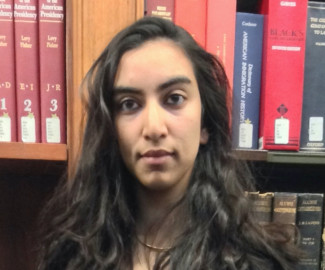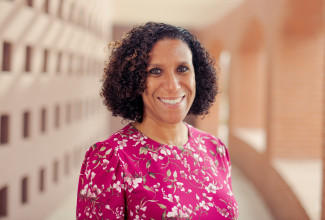
Johns Hopkins UniversityEst. 1876
America’s First Research University
The Racial Politics of Periodization

The journal New Literary History focuses on questions of theory, method, interpretation, and literary history. By examining the bases of criticism, the journal provokes debate on the relations between literary and cultural texts and present needs.
The journal's most recent issue, titled Race and Periodization, asks the question "What does an inquiry across traditionally demarcated historical periods afford critical race studies, and how does early critical race studies work to articulate or contest regimes of historical knowledge?"
We asked Guest Editors Urvashi Chakravarty and Ayanna Thompson to tell us how this special double issue came together.
What is your specific area of research? What brought you to your area of academic focus?
Urvashi Chakravarty: My specific area of research is early modern English literature, with a particular focus on premodern critical race studies, queer and sexuality studies, and the history of slavery. In my first book, I investigate how ideologies of racialized slavery were formed in and through early modern England – including through the reception of classical slavery and in everyday spaces and places like the grammar school classroom, the household, and the public theatre – and in turn scripted the logics of heritable slavery that took hold in the Atlantic world. In my current book, meanwhile, I explore the nexus of race and reproduction in early modern British Atlantic contexts of slavery, and argue that English practices of imperialism and enslavement were underwritten by the creation of white womanhood and white childhood as racialized constructs in ways that continue to reverberate in our current moment. In addition, I am interested broadly in the intersection of race and sexuality, in figurations of family and kinship, in the representation and racialization of service and slavery, and in the nexus of race and class. What brought me to these areas of enquiry is the question: how did the cultural, social, and political narratives of today come about? How did their authorizing fictions and frameworks develop? For instance, in my first book, the animating question for me was: how and why did the persistent fiction that England was innocent of slavery take hold? I am deeply interested in the methodological stakes of recovering genealogies, especially of race and class, and these are the concerns that have continually informed my work.
Ayanna Thompson: My research focuses on both the history of racial formation in/as performance and the history of casting Shakespeare’s plays. While most of my published work has been pitched to academic audiences, theatre practitioners have discovered it and now I have found myself working in theatres a lot. I’ve tackled the history of inclusive/nontraditional casting, the history of blackface, and the ways the notions of “Shakespeare” and “race” are inextricably linked in contemporary American society.
As you note in your introduction, several papers in the issue were first presented in the second symposium of RaceB4Race - can you tell us more about this project and what its goals are?
RaceB4Race is both a series of symposia focusing on scholarship by scholars of color, and a community of BIPOC students, researchers, practitioners, and activists. RaceB4Race was founded by Ayanna in early 2019, and in the past three years it’s grown to encompass not just events and conferences but also public-facing initiatives and mentorship structures which aim to amplify premodern critical race studies. RaceB4Race is multidisciplinary and interdisciplinary, and the community includes not only scholars and students but also theatre practitioners, artists, and activists in order to build a broad coalition looking to create a better and more just future for premodern studies. Amongst its other endeavors, RaceB4Race is, with generous funding from the Mellon Foundation, working on pedagogical resources, social media content and training for broad outreach, and public-facing scholarship and conversation.
You write that this special issue asks "what, then, are the racial politics of periodization?" Can you give our readers an example of how the historical demarcation of time periods can have deeper implications for racial politics?
Yes! One of the instances we discuss in the introduction concerns the idea that ‘race’ begins in the eighteenth century as an Enlightenment development; that it arose as part of a larger interest in systems of scientific and human classification. The Enlightenment is frequently understood and taught and periodized as a kind of high watermark, a decisive historical shift from what came before. But situating the provenance of race within this historical moment locates it as a scientific phenomenon and propagates fallacies of race as somehow biological and essential rather than cultural and strategic. Thus, the longstanding demarcation of ‘the Enlightenment’ as a specific and singular historical period has served to reaffirm a concomitant understanding of race as biological rather than cultural, and – just as insidiously – has also worked to absolve earlier periods of any knowledge of race (after all, if race was invented in the eighteenth century, how could it have existed before then?). This has created the longstanding view that earlier periods – the early modern/Renaissance period, the medieval period, and even earlier – ‘didn’t have’ race, were in fact ‘innocent’ of race, which in turn has stymied a full and frank reckoning with the racial politics of how power operated in the service of property, empire, and colonialism in those historical periods. Uncovering these earlier histories is part of the mission of RaceB4Race, which in its very name (as we discuss in the Introduction) invokes this historical demarcation – of race ‘before’ race – in order to challenge it.
Was there a call for papers for submissions on the topic (that weren't part of the symposium)?
While there are several articles written by people who presented at the RB4R symposium, we also invited several other scholars who are doing powerful work at the nexus of race and periodization. Premodern critical race studies is such a vibrant field now that there many scholars working in different languages and disciplines.
What was the most challenging thing about putting this issue together?
The contributors to this issue produced outstanding scholarship, and the editor and managing editor of NLH, Bruce Holsinger and Mollie Washburne, did extraordinary work in shepherding this issue through publication. The most challenging aspect was perhaps logistical: we began work on this issue at the beginning of the pandemic, and authors were writing and revising their essays through lockdowns, and online teaching, and caregiving responsibilities. And in 2020, with the murder of George Floyd and global protests for racial justice, there seemed to be an opportunity – yet to be realized – for a real racial reckoning. We are immensely grateful to all the contributors for their work and their time and their care, which amidst all these social and political upheavals, was, we know, deeply hard-won.
What do you hope readers take away from their time with the issue?
Whilst all the essays in this issue speak to the purchase that critical race studies can have for an enquiry into periodization—and vice versa—there are a variety of approaches and interventions on display in this collection. We hope that readers will take time to think about what the term ‘Premodern Critical Race Studies’, which Margo Hendricks coins in her piece, really means, and how it encompasses not just theory but praxis, too; and we hope that readers will grapple with the racial and imperial fictions that particular periodizing regimes have advanced, as Mary Rambaran-Olm and Nicole Lopez-Jantzen, amongst others, discuss in their work. Several authors unpack the global and transnational possibilities of and challenges to traditional and often Eurocentric forms of periodization, such as Su Fang Ng and Nizar Hermes and Mary Beth Allen, whilst others illuminate the range of sites where we can find different sites of racial periodization at work, from lexical philology (in Haruko Momma’s essay) to contract and racial capitalism (in Farid Azfar’s piece). We hope, too, that readers will reflect on the different and often hidden investments that we have (sometimes without even realizing it!) in particular frameworks of periodization; Carol Meija LaPerle’s and Wan-Chuan Kao’s essays, for instance, both think in really powerful ways about the affective investments in periodization and the work that nostalgia undertakes. And finally, we hope that readers will think about how our current historical moment and present understandings of race have been informed by and indeed are a product of the periodizing regimes we discuss; these are questions that Ruben Espinosa’s and Kyle Grady’s essays take up in thinking, respectively, about borderlands and about interracial mixing.
What's next for you? Any upcoming papers or books you'd like to share with us?
Urvashi Chakravarty: Yes! My first book was just published by Penn Press last month; it’s called Fictions of Consent: Slavery, Servitude, and Free Service in Early Modern England, and it is the first volume in the press’s new series on Premodern Critical Race Studies, with Ayanna Thompson and Geraldine Heng as series editors. I also have several articles forthcoming, among them one on early modern racial fictions in English Literary Renaissance, and another on the construction of white womanhood in the contexts of English enslavement, which is taken from my second book, in Renaissance Quarterly.
Ayanna Thompson: I have several articles forthcoming, and Curtis Perry and I are wrapping up our Arden4 edition of Titus Andronicus. I’m also working on several shows, including Suffs (a new musical at The Public Theater), Macbeth (on Broadway, starring Daniel Craig and Ruth Negga), and Richard III (Shakespeare in the Park in summer 2022, starring Danai Gurira).

Urvashi Chakravarty is Assistant Professor of English at the University of Toronto and works on early modern English literature, critical race studies, queer studies, and the history of slavery. Her first book, Fictions of Consent: Slavery, Servitude, and Free Service in Early Modern England (Penn Press, 2022), explores the ideologies of Atlantic slavery in early modern England; her second book, currently in progress, is titled From Fairest Creatures: Race, Reproduction, and Slavery in the Early Modern British Atlantic World. Her articles appear or are forthcoming in English Literary Renaissance, Shakespeare Quarterly, Renaissance Quarterly, the Journal of Early Modern Cultural Studies, Spenser Studies, postmedieval, Literature Compass, and the edited collections Queering Childhood in Early Modern English Drama and Culture, Shakespeare/Sex: Contemporary Readings in Gender and Sexuality, and The Cambridge Companion to Shakespeare and Race.

Ayanna Thompson is a Regents Professor of English at Arizona State University, and the Director of the Arizona Center for Medieval & Renaissance Studies (ACMRS). In 2021, she was inducted into the American Academy of Arts and Sciences.
Thompson is the author of Blackface (Bloomsbury, 2021), Shakespeare in the Theatre: Peter Sellars (Arden Bloomsbury, 2018), Teaching Shakespeare with Purpose: A Student-Centred Approach, co-authored with Laura Turchi (Arden Bloomsbury, 2016), Passing Strange: Shakespeare, Race, and Contemporary America (Oxford University Press, 2011), and Performing Race and Torture on the Early Modern Stage (Routledge, 2008). She wrote the new introduction for the revised Othello (Arden, 2016), and is the editor of The Cambridge Companion to Shakespeare and Race (Cambridge University Press, 2021), Weyward Macbeth: Intersections of Race and Performance (Palgrave, 2010), and Colorblind Shakespeare: New Perspectives on Race and Performance (Routledge, 2006). She is currently collaborating with Curtis Perry on the Arden4 edition of Titus Andronicus.
Thompson serves as a Shakespeare Scholar in Residence at The Public Theater in New York, and currently serves on the boards of the Royal Shakespeare Company, the Folger Shakespeare Library, the National Parks Arts Foundation, and Play On Shakespeare. She is a past-President of the Shakespeare Association of America.


